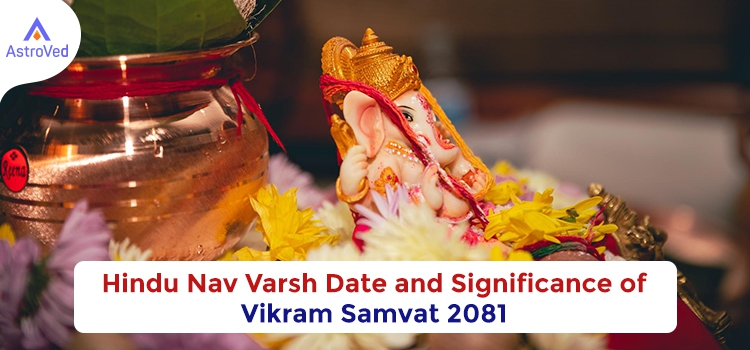Hindu Nav Varsh Date and Significance of Vikram Samvat 2081
'Nav Varsh’ in Hindi means ‘New Year’. In most countries, people celebrate the New Year on January 1. However, in India, which is home to a Hindu majority, the Hindu calendar is followed, and the New Year falls in the month of Chaitra (March-April). The Hindu New Year begins with the 9-day Navratri festival, also called Chaitra/Vasant Navratri. This also marks the advent of the spring season. There are 12 months in the Hindu calendar. Phalgun is the last month, while Chaitra is the first.
The Hindu New Year is also known as Vikram Samvat, Ugadi, Gudi Padwa, Puthandu, Baisakhi, Cheti Chand, Navreh, Sajibu Nongma Panba, Samvatsar Padva, etc., in different regions of India.
In Karnataka, Telangana, and Andhra Pradesh, people celebrate the New Year as Ugadi. In North India, it is Baisakhi, which also coincides with the harvest festival; in Odisha, it is Pana Sankranti; in Kashmir, it is Navreh; in Maharashtra, it is Gudi Padwa; in Tamil Nadu, it is Puthandu; in Kerala, it is Vishu; Sindhis call it Cheti Chand, and so on.
Hindu Nav Varsh 2024 is on April 9.

Hindu New Year Vikram Samvat 2081
Vikram Samvat is the basis of Hindu Nav Varsh. The Scriptures mention a total of 60 Samvatsaras. Vikram Samvat 2081 begins on April 9, 2024, and will be called Krodhi. This year, the king of the Samvat will be Mars and the minister is Saturn. As per astrological calculations, the planet which is dominant on the first day of the Hindu New Year will own the entire year. Also, the planetary alignment on the day of the Hindu New Year will have an influence on the events of the entire year.
In India, Vikram Samvat, or the new year, is on Chaitra Shukla Pratipada Tithi. This happens to be the first day of Chaitra/Vasant Navratri. As per mythology, Lord Brahma began the process of creation on this day. For this reason, Chaitra is regarded as the first month of the Hindu Nav Varsh.
History of Vikram Samvat 2081
According to legends, 2068 years ago, King Vikramaditya of Ujjain freed his people from the rule of the Sakas and initiated Vikram Samvat. Vikram Samvat is the traditional calendar used by Hindus across India. It precedes the Gregorian calendar by 57 years. Thus, the year 2024 will be Vikram Samvat 2081.
The Hindu New Year is based on the lunisolar Vikram Samvat/ Vikrami calendar, which harmoniously combines the cycles of the moon and the sun. This ancient timekeeping system has great significance in India. While the Gregorian calendar follows the sun's cycles, Vikram Samvat calendar is based on the cycles of the sun as well as the moon. This can cause occasional divergences. The Gregorian calendar's New Year 2024 will be called Vikram Samvat 2081. Thus, the Vikram Samvat is 57 years ahead of the Gregorian calendar, except for the months of January to April, when it is 56 years ahead.
The Vikram Samvat calendar not only helps establish the date of the Hindu New Year but is a custodian of India’s ancient history, wisdom, and heritage. Its unique lunisolar structure reflects our ancient sages’ deep understanding of astronomical principles. It is a remarkable calendar system that upholds the dates, traditions, cultural practices, and rituals associated with the Hindu Nav Varsh/New Year. This ensures their preservation and transmission across generations, connecting Hindus to their glorious heritage for centuries.
Vikram Samvat 2081 Predictions
Mars will rule on Chaitra Shukla Pratipada, which is a Tuesday, while Saturn will assume the role of a Prime Minister when the Sun enters Aries on Saturday. Mars and Saturn are powerful planets in astrology. The qualities of the king and Prime Minister will affect not only the 12 zodiac signs but also influence the nation’s destiny.
Being ruled by Mars and Saturn, two planets that are considered to have malefic qualities, experts predict that the year may see a lot of turmoil. In India, the economy may become sluggish. It is also possible that a new disease or epidemic may break out. Due to the influence of Rahu, Mars, Saturn, and the Sun, there will be an increasing frequency of natural calamities. Several storms, earthquakes, and floods may cause loss of lives and property. Enmity among political parties is likely to increase. This could lead to political instability and social unrest. Internal conflicts within the country may grow deeper.
Mars will be the dominant influence in 2024. This can result in many challenging decisions. The current ruling party is likely to retain power, and there may be bold and groundbreaking decisions with major consequences. Difficult decisions will be pushed through despite resistance, as Mars is associated with leadership and courage.
Also, Mars and Saturn’s influence can lead to an expansion of the country’s borders. This will escalate tensions along the borders. Despite potential problems, the country may progress, and its global reputation may also grow.
Hindu Nav Varsh Rituals
Nav Varsh marks new beginnings. People are filled with hope and excitement as the new year can bring happiness and prosperity. It is a time to set aside the disappointments of the old year and make new resolutions for a better future. To start the New Year on an auspicious note, therefore, people observe many rituals. Such rituals may differ from region to region. However, some things are common, as well.
All over the country, people welcome the New Year by cleaning and decorating their homes, creating colorful Rangolis, wearing new clothes, going to temples to invoke the blessings of deities, etc. They also get together with friends and family and enjoy themselves. Special dishes and sweets are also prepared and shared with loved ones.
Many people also worship Goddess Durga on the first day of Vikram Samvat and install a Kalash at an auspicious time in their house. They believe that this eliminates problems and attracts happiness, prosperity, and well-being throughout the year. It can also ward off financial, physical, and mental troubles.



















